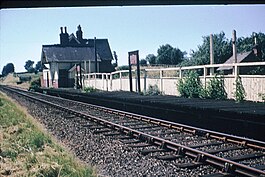Farthinghoe railway station
| Farthinghoe | |
|---|---|

Station in 1959.
|
|
| Location | |
| Place | Farthinghoe |
| Area | South Northamptonshire |
| Grid reference | SP522403 |
| Operations | |
| Original company | Buckinghamshire Railway |
| Pre-grouping | London and North Western Railway |
| Post-grouping |
London, Midland and Scottish Railway London Midland Region of British Railways |
| Platforms | 1 |
| History | |
| c. October 1851 | Opened |
| 3 November 1952 | Closed to passengers |
| 2 December 1963 | Closed to goods |
| Disused railway stations in the United Kingdom | |
| Closed railway stations in Britain A B C D–F G H–J K–L M–O P–R S T–V W–Z |
|
|
|
|
Farthinghoe was a railway station which served the Northamptonshire village of Farthinghoe in England. It opened in 1851 as part of the Buckinghamshire Railway's branch line to Verney Junction which provided connections to Bletchley and Oxford and closed in 1963.
Situated in an isolated location over a mile from the village from which it took its name - and further still from two others it was supposed to serve: Greatworth and Middleton Cheney - Farthinghoe station first appeared in timetables in October 1851. Its precise opening date is unknown, but was almost certainly within one year of the line's inauguration.
The Buckinghamshire Railway provided basic facilities which consisted of a single wooden platform and solitary goods siding on the up side of the line. The main station building, a part-timber and part-brick structure in an "H" shape, was of unusual construction, with the main ticket office and booking hall housed in a one-storey weather-boarded wing with a steeply-pitched gable roof which projected over the platform as a sort of makeshift canopy. The stationmaster occupied an adjacent two-storey building which was linked with the ticket office by a two-storey tile-hung central block which contained a waiting room. The style of construction can be explained by the Buckingham Railway's need to save on costs in the face of an economic crisis.
The station boasted limited goods facilities, with a cattle dock and weigh bridge provided for the mainly agricultural traffic. Until the mid-1930s, goods trains would shunt the siding daily with regular loads of pink roadstone granite as well as coal for W. Palmer & Son, local coal merchants. The Second World War saw Farthinghoe handle ammunition destined for the RAF's Hinton-in-the-Hedges Airfield.
...
Wikipedia
